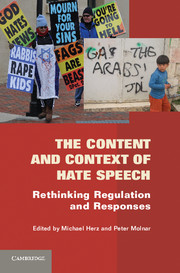Book contents
- Frontmatter
- Contents
- Contributors
- Foreword: Hate Speech and the Coming Death of the International Standard before It Was Born (Complaints of a Watchdog)
- Foreword: Hate Speech and Common Sense
- Acknowledgments
- Introduction
- Part I Overviews
- Part II Refinements and Distinctions
- Part III Equality and Fear
- 16 Hate Speech and Political Legitimacy
- 17 Reply to Jeremy Waldron
- 18 Waldron, Machiavelli, and Hate Speech
- 19 Shielding Marginalized Groups from Verbal Assaults Without Abusing Hate Speech Laws
- 20 Interview with Nadine Strossen
- 21 Interview with Theodore Shaw
- Part IV International Law
- Index
- References
19 - Shielding Marginalized Groups from Verbal Assaults Without Abusing Hate Speech Laws
Published online by Cambridge University Press: 05 June 2012
- Frontmatter
- Contents
- Contributors
- Foreword: Hate Speech and the Coming Death of the International Standard before It Was Born (Complaints of a Watchdog)
- Foreword: Hate Speech and Common Sense
- Acknowledgments
- Introduction
- Part I Overviews
- Part II Refinements and Distinctions
- Part III Equality and Fear
- 16 Hate Speech and Political Legitimacy
- 17 Reply to Jeremy Waldron
- 18 Waldron, Machiavelli, and Hate Speech
- 19 Shielding Marginalized Groups from Verbal Assaults Without Abusing Hate Speech Laws
- 20 Interview with Nadine Strossen
- 21 Interview with Theodore Shaw
- Part IV International Law
- Index
- References
Summary
“Between the strong and the weak, between the rich and the poor, between master and servant, it is freedom that oppresses and the law that sets free. [Entre le fort et le faible, entre le riche et le pauvre, entre le maître et le serviteur, c'est la liberté qui opprime, et la loi qui affranchit.]”
– Jean-Baptiste Henri Dominique Lacordaire (1802–1861)“…and their word will consume like gangrene.”
– The Bible, 2 Timothy 2:17Introduction
In this chapter I argue that “the marketplace of ideas” metaphor for free speech perpetuates deep and built-in structural societal imbalances. I argue that substantive, or real, equality demands the prohibition of hate speech that targets historically nondominant and oppressed minority groups to enable these groups to renegotiate their status and power in society. An attempt to prohibit hate speech against all ethnic groups without regard to the ethnic dynamics in the country, however, tends to shut off a large amount of much-needed political debate. I will explore the cross-cutting issues of regulating hate speech and protecting minorities in richly diverse and deeply divided societies, in particular Ethiopia. I will show the difficulty of regulating speech that relates to ethnicity when ethnicity itself is a prime vehicle for political organization and mobilization. Finally, I will explore how hate speech regulation has been utilized in Ethiopia and other African countries as a pretext and tool to suppress opposition to the government and perpetuate the subordination of historically oppressed minorities.
- Type
- Chapter
- Information
- The Content and Context of Hate SpeechRethinking Regulation and Responses, pp. 352 - 377Publisher: Cambridge University PressPrint publication year: 2012
References
- 7
- Cited by

